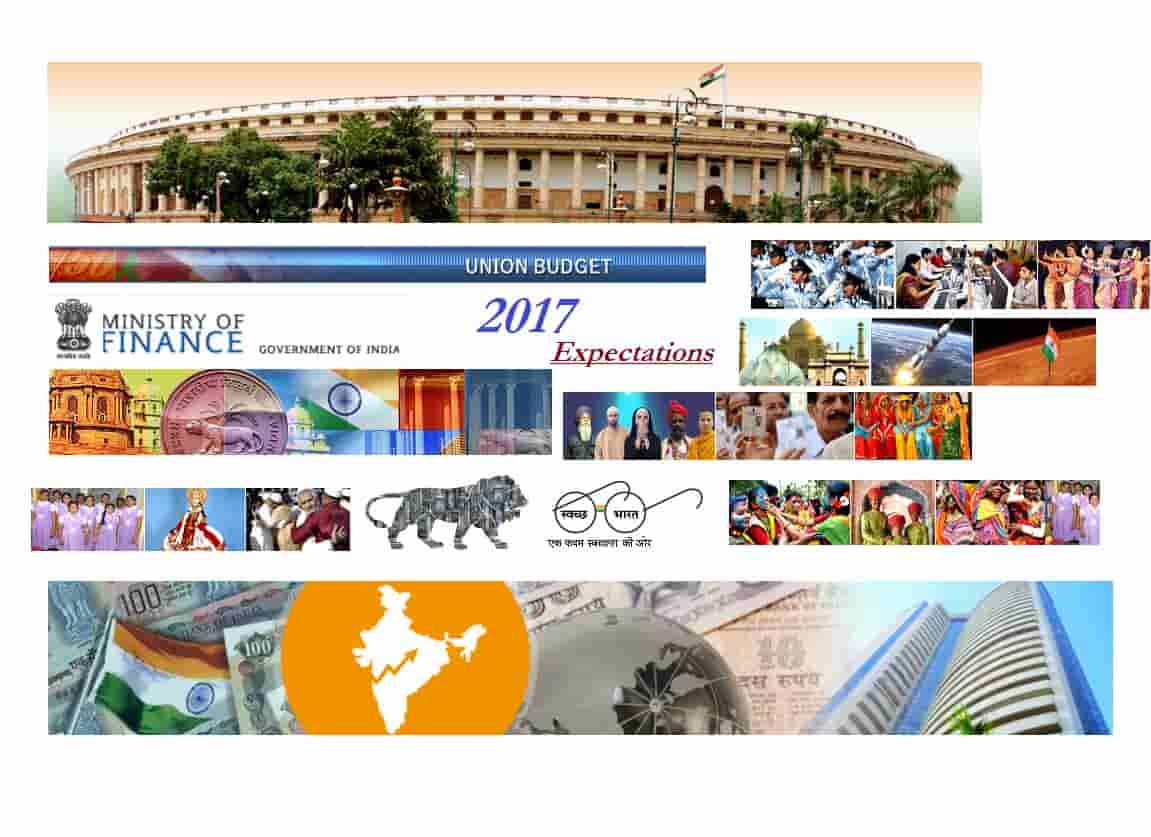India Inc. is looking with great anticipation at the Union Budget 2017 announcement, on February 1, 2017. This is the next major announcement by the Government of India after the recent Demonetization drive and is expected to spell out the policies for the world’s fastest growing economy. Team Estrade spoke to industry leaders, to know their expectations from the Union Budget 2017. This is brought to our readers as a miniseries, where India Inc.’s business leaders share their concerns and insights.

Umesh Revankar, MD – Shriram Transport Finance
With successful implementation of demonetisation, it is that time of the year wherein Union Government’s fourth and most awaited budget would be announced. The key thrust area of the budget 2017-18 should be Infrastructure, SMEs and Rural economy.
The overall economic development gets a push through faster and efficient connectivity. The major infrastructure focus should be on ports, railways and roads to reduce the logistics cost which is probably one of the highest in the world for movement of goods. Further, the government should arrange easy financing policies for infrastructure companies.
Power sector is one of the critical infrastructures to strengthen the manufacturing base. Thus, budget should encourage investment in power sector. There should be increased focus on renewable energy by giving tax breaks and subsidies.
Additionally, today the rural India is playing a very important role in influencing the manufacturers to increase their scale and expanding their capacities. The manufacturing activity especially the SMEs segment which is rural based needs further drive. With GST likely to be implemented in next fiscal year and the ease of doing business has to become main agenda and the state governments should be encouraged by providing further funds based on ranking on this count. This will not only help to create more employment opportunity but also increase our exports.
In the budget FY 2015-16, MUDRA (Micro Units Development & Refinance Agency Ltd) was set up as a subsidiary of SIDBI for refinancing of loans by banks, NBFCs and microfinance companies. The budget should bring the refinancing through MUDRA to the banks and NBFCs at par (and if not all NBFCs, atleast the good rated ones).
The government should widen the scope of MGNREGA scheme by including toilets, building schoolrooms, drinking water, tank, road etc. This will enable to increase the rural productivity and also develop quality infra. Also, by building their own infrastructure, feeling of ownership and pride will also develop among the local people. It will also support earnings for the poor that helps local education of their children, and also creates awareness about cleanliness by the usage of toilets, giving the ‘Swach Bharat’ campaign a very big boost. Government has to increase social spending on education, health care and mass transportation.
Post demonetisation and government drive to promote cashless transactions; the budget should announce policies wherein all the government companies and public utilities don’t charge any taxes on the payments done through digital platforms.

Samson Khaou, Managing Director – Dassault Systemes India
“India is on a high growth path currently and is meant to focus on improvement in technology infrastructure and evolve as a super power by 2020. We expect the government to pursue the positive momentum for the dynamic and ambitious national projects like Make In India, Smart Cities and Digital India. With the enhanced focus on smart cities, this year we expect the Government to continue with the impetus on infrastructure and manufacturing. Budget 2016 focused more on all-inclusive growth including boosting digital literacy, improved connectivity and access to technology across sectors. We hope to see a continued focus by the government of India in the realms of technological advancements. In the past one year the country has witnessed rise in FDI points to stronger investor interest in India on the back of robust economic growth. Higher inflows suggest that recent government policies, such as efforts to liberalize foreign investment limits in several sectors and the ‘Make in India’ initiative, are bearing fruit. ‘Make in India’ campaign has been a great success and we are looking forward to its positive returns in the upcoming years.
Local manufacturing is the back bone for Make in India, it is important that our Foreign Trade Policy recognizes the need to ensure world class manufacturing facilities adoption by domestic players. The policy must offer subsidies on investments and incentives to small and medium scale manufacturers and encourage easier imports of capital goods, industrial raw materials, tools and components with the objective to upgrade the quality and competitiveness of our domestic manufacturing. Also, in order to accelerate the GDP growth of our nation, the budget also needs to focus on ‘high technology skill development’ and create industry ready talent.”

Manav Dhanda, Group CEO, SABGROUP
“From a media industry perspective, I feel that a change in the definition of industrial undertaking for the services industry as well as a push to define the GST roadmap would be sector-positive. There is a landmark attempt in the budget to simplify the tax administration, which should herald a friendlier tax regime. Overall there are some positives and some negatives that can be expected. Not increasing the service tax is a positive, particularly for the advertising and media sector. The general expectation will be that Service Tax may go up in anticipation of higher GST rates. Controlling the fiscal deficit and several steps to invigorate the rural economy and rural consumption are positive signals. A rural consumption revival will help the economy and the advertising and media sector tremendously. On the negative side, there will an expectation based on what the Finance Minister said in the past, that corporate tax rates would come down. In balance there seems an expectation of a mixed bag budget with a positive bias. If it is able to spur overall economic growth, we could see good times ahead for the advertising and media sector. Digitisation, in my opinion is the most important factor for the broadcast sector currently, change in excise duty changes proposed for set-top-boxes might help in the last mile infrastructure of Digital Addressable System (DAS). Overall, a stable and positive fiscal situation is good for the economy and that will support our ad sales growth projections. Kudos to the government for presenting a disciplined and inclusive budget last year so the emphasis on rural development and commitment to the fiscal deficit should be the target augur well for the economy in the long-run. The proposal for a more conducive excise duty regime for STBs and other ‘entertainment-access devices’ would be welcome. While many of us from the industry are anticipating more sector-specific announcements, I’m sure that this budget will benefit the larger economy and therefore, by extension, have a positive impact on our industry as well.”

Sanjay Dhande, Chief Mentor, Avantika University and Former Director, IIT Kanpur.
“To achieve the target of skilling India program, the Government needs to take several initiatives to ensure that incentivize institutions that facilitate these skills. Further push is necessary to implement policies that support this initiative so that there is only brain gain and no brain drain. What we need now is a simpler taxation policy which will encourage more players to invest in the education sector by starting new universities and a stronger university ranking framework . Cheaper loans and increase in number of scholarships will ensure more students can take benefit of quality education.
Special focus needs to be given towards expediting plans of creating 20 world class institutions. It would be important for the government to lower the gap in student to faculty ratio. There is a need to expedite the overall implementation of the New Education Policy as there are big reforms under that which have the potential to bring about a paradigm shift in teacher development and pedagogical reforms.
It is also very essential that the upcoming budget increases the GDP ratio to 8% for the education sector as this will help increase government’s share for children’s education thus, reducing financial pressure on parents. Incentivizing institutions, provision of quality infrastructure and integrating education with the Digital India program will leverage the education initiatives undertaken by the government. A massive investment in state-funded institutions will make higher education affordable and accessible at the same time.”

Uday Reddy- CEO, Founder, YuppTV- India’s largest OTT player
“2016 has been an impressive year for the OTT industry in India. Given the 4G spectrum sales and increasing affordability of smartphones, India transformed into a mobile-first economy. In 2017, I expect Government to help us sustain the momentum. For the same, certain funds should be dedicated solely to boosting the reach of internet, especially to tier 2, 3 and 4 cities and towns. Since majority of OTT viewership is still subject to Wi-Fi, improving the broadband access and Fiber optics network shall also be considered under the budget.”

Gunjan Srivastava, MD &CEO – BSH Household Appliances.
“This year, the Union Budget is going to be extremely important for us, both in terms of retail and in terms of projects – these are the two sides of the business we deal in. As far as retail is concerned, we know that because of demonetization there has been a decline in terms of consumer purchase. So, we are looking forward to incentives in the hands of the consumer in terms of more money in his pocket which will motivate the consumer to go and purchase more. From a projects perspective, we are also hoping that the real estate and home buying gets a boost. That is something which has been slow in the last few months and if there are breaks in that regard, it will incentivize the consumer to buy homes. If interest rates are rationalized, then we feel that will be a big boost to our projects business and sector.
And last but not the least, we are all looking forward to complete clarity on GST implementation front, both in terms of the final go live time and more importantly clarity on the GST rates for respective categories. Also in terms of formulating strategies going forward, what is important is to understand what further steps are taken in to drive Make in India.
In all, this promises to be a historic budget and as a part of the consumer appliances and consumer goods industry, I am really looking forward to something which will enhance the consumer and retail purchase and also do a lot in terms of home purchase and improvement.”

Rajiv Bhalla, Managing Director, Barco India
Government of India has covered massive strides in transforming our country into a digital, less cash-oriented economy. Post demonetization we have seen a doubling of debit card and mobile wallet transactions. In this process of creating a cash free economy, we expect the budget to incentivize digital payments and provide for ample enabling infrastructure; this will encourage SMEs to adopt digital finance channels and become a part of the formal financing ecosystem, We would furthermore, welcome the frameworks necessary for addressing the present issues, especially the ambiguous and redundant regulations.

Satya Prabhakar – Founder & CEO, Sulekha
“To further the cause of digitization and boosting the digital ecosystem, the government should abolish service tax on Internet-related services such as broadband services, internet advertising, food delivery, so on. This will encourage the adoption of the same and also allow for payments to be become digital.”

Deepak Chandnani, CEO of Wordline South Asia and Middle East.
“The government is taking many steps to further the cause of digital payments and move towards a less-cash economy. However, with the reduction in MDR and other short-term measures, the acquiring business is losing its profitability. In the upcoming budget, we hope that the government takes a long term perspective and brings in measures that make the business viable again. Also, the industry would benefit from the proposed Acceptance Development Fund (ADF), which in turn will accelerate the growth in the acceptance infrastructure of the country.”

Shubika Bilkha, Business Head – The Real Estate Management Institute (REMI)
“Given the impact that the recent demonetisation initiative has had on the sector, as well as the impact of increased regulatory vigilance, the real estate industry is hoping for added confidence boosting measures in this years budget. With its significant contribution to GDP and overall employment in the Country, the sector has also long awaited ‘industry status’ that it remains hopeful for in this years budget.
To meet the stipulation of timely delivery of projects under RERA 2016, the need for the introduction of a single window clearance has never been more heightened. Furthermore, with the impending introduction of the GST regime, there is a need for added clarifications to determine the overall impact on the sector.
Additionally, with the regulations under RERA 2016 reducing the opportunity for funding through advance bookings and banks not being able to support financing of land transactions, simplifying the tax regime of REITs has become essential. This will include reducing the level of taxation on REIT income, having a waiver for capital gains tax for REITs on the transfer of property and making leasing of premises more attractive and less subject to the high service tax rates.
To boost consumer demand in the sector, the industry hopes for more favourable taxation measures to be introduced by the government. These include increasing the tax deduction limit for housing loans to make it more in sync with the high cost of real estate in metropolitan India, raising the House Rent Allowance (HRA) and encouraging consumers to adopt home insurance through tax concessions on premiums.”
ia Inc. Union Budget 2017 Expectations






